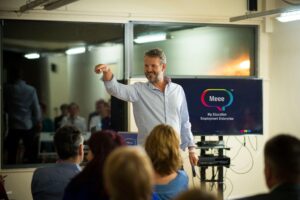By Sid Madge, author of the ‘Meee in a minute’ series of books
2020 is proving to be the toughest year that most of us can remember. We’ve got through so far and can now look at how to adapt and get the most we can from the remaining few months of this year.
According to a YouGov poll only 8% of Britons want to go back to life as it was before the pandemic.
Let’s create something better for everyone instead of some watered down ‘new normal’. The first step for squeezing the best out of the rest of 2020 is to embrace uncertainty. There isn’t going to be some miracle vaccine by December, so what do we do now and for the rest of the year? We grab the remainder of the year by the scruff of its neck and focus on changing for the better.
Your Innate Growth Mindset
Stanford psychologist Carol Dweck became obsessed with understanding how people cope with failures and setbacks. Initially her research looked at kids and how they reacted to puzzles they couldn’t solve. The outcome of Dweck’s research is now world famous and she proposes that our success and happiness in life comes down to one thing – mindset. According to Dweck there are two – fixed and growth.
Individuals with a fixed mindset, have a fixed idea of what they are capable of, believing that what they are born with is the finish line. They tend to be more defeatist. Those with a growth mindset believe that what we are born with is just the beginning. What we are capable of is determined by our own aspirations, effort and determination.
Interestingly, Dweck believes we are all born with a growth mindset. We get trained out of it. We’re taught that failure is unacceptable – even though all great success comes through failure not by avoiding it. If ever we needed to re-assess that growth mindset it’s now.
Take a minute to consider whether you have a fixed or growth mindset? Has Covid-19 made it more fixed as you sink into a gloom? If you imagine you had a growth mindset instead – what would you do? Looking at your life and the rest of 2020 – what could you try? What have you always thought of doing but never got around to it? Lean into the uncertainty and adapt. Use it as a springboard to try things you’ve been putting off. Is there a different market you could approach? Stay curious, flexible, and open.
Changing Your Today to Change Your Tomorrow
What have you done today? Is that getting you closer to your business and life goals or further away? If you want a different tomorrow so you find a successful way through the pandemic, you need to take steps to change what you do today.
Stop for a moment and reflect on how you spend your time. When did you get up this morning? How much TV do you watch? How much time do you spend on social media? How much time do you spend learning something new? Do you spend time with family or friends? Are those exchanges enjoyable or stressful? How much time do you spend on your health? How much sleep do you get most nights?
Take a minute to draw a circle and divide it up into slices that represent how you spend your time during a typical day. Now draw another circle and divide it up to represent how you would like to spend your day. If you spend a lot of time at work but don’t enjoy it, what could you do today to find a something that you might enjoy more? Or what could you change at in work/home life today to improve your day? Identify the things you like or can live with and the things that you don’t like and can’t live with. How can you change the aspects of your day that bring you down?
Often, we don’t need to make big sweeping changes. Subtle little shifts can accumulate to bring about change.
Growth from Trauma
In 1967 psychiatrists Thomas Holmes and Richard Rahe developed a list of 47 stressful events that could impact health and happiness. The assumption is logical – we get more stressed when bad stuff happens to us, start accumulating stressful experiences such as a job loss, illness or divorce and you are more susceptible to physical illness, disease and depression. Global pandemics and economic uncertainty don’t help either.
However, the fly in their theoretical ointment was the fact that not everyone who experienced really tough life events were negatively impacted by them. On the contrary, some of those people actively flourished. This field of study is called post traumatic growth or adversarial growth and studies have shown that great suffering or trauma can actually lead to huge positive change. For example, after the Madrid bombings of 2004 psychologists found that many of those affected experienced positive psychological growth. A diagnosis of cancer and subsequent recovery can also trigger positive growth.
The people in many of these studies found new meaning and new purpose from surviving something terrible. Instead of seeing their situation as a failure or a problem they believed it could make them stronger. How can you use Covid-19 to find new meaning and positive growth?
Take a minute to think about exactly what you are worried about most in your life and identify one thing you can do about it right now. Set that in motion. What positives could you pull from the turmoil? Get creative – think of at least three positives that Covid-19 could give you. It might not be fun but if you can find the silver linings you can often move on quicker.
These suggestions are pulled from my Meee in a Minute books, each offering 60 one-minute micro-ideas and insights that can help us to shift our perception in life, family and at work. We can all use tiny interventions to adapt and change and make the very best we can of the months ahead.
ABOUT THE AUTHOR
Sid Madge is founder of Meee (My Education Employment Enterprise) which draws on the best creativity and thinking from the worlds of branding, psychology, neuroscience, education and sociology, to help people achieve extraordinary lives.
To date, Meee has transformed the lives of over 20,000 people, from leaders of PLC’s and SME’s to parents, teachers, students, carers, the unemployed and prison inmates.
Sid Madge is also author of the ‘Meee in Minute’ series of books which each offer 60 ways to change your life, work-, or family-life in 60 seconds.
Web: www.meee.global
Web: www.meeebooks.com
Twitter twitter.com/Meee_HQ
Facebook https://www.facebook.com/MeeeHQ/
Instagram www.instagram.com/meeehq
YouTube https://youtu.be/fISupZWZMQc
TEDx https://www.youtube.com/watch?v=bR3Cyjs62c8



